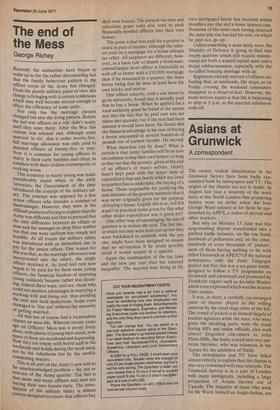The end of the Mess
George Richey
Recently the authorities have begun to wake up to the the rather disconcerting fact that the family behaviour pattern in the Officer corps of the Army has changed. From the purely military point of view this Change is bringing with it certain tendencies Which may well become serious enough to affect the efficiency of some units. Not only has the marriage pattern Changed but also the living pattern. Before the last war officers as a rule 'didn't marry until they were thirty. After the War this custom was relaxed and, although some married 'in sin', that is under twenty-five, full marriage allowance was only paid to married officers of twenty-five or over. Now it is common for young officers to marry in their early twenties and often, in common with their civilian counterparts, to working wives.
This tendency to marry young was made .onsiderably easier when, in the. early seventies, the Government of the time introduced the concept of the military salary. The concept was opposed by a few senior officers who foresaw a number of disadvantages. However, they were in the difficult position of trying to explain that the Army was different and that to pretend that the only difference between an officer or man and the manager or shop floor worker was that one wore uniform was simply not feasible. At all events the military salary was introduced with an immediate rise in Pay for the junior officer. One reason for this was that, as the marriage allowance was incorporated into the salary, the single officer received it. As food and rent now began to be paid for by these same young officers, the financial burdens of marrying Y. ming suddenly-became rather less daunt
ing; indeed there 'were, and are, those who could see positive advantages in marrying a working wife and living out, thus avoiding the rent and food deductions. Some even managed to 'live out' without the necessity of getting married. All this has of course had a tremendous impact on mess-life. Whereas twenty years ago an Officers' Mess was a pretty lively Place, with plenty of young men about, now Many of them are moribund and depressing. Now they are empty with bored staff at the
Weekends and hotels during the week used, not by the subalterns but by the weekly commuting majors. _ This is all part of the Army's new and so far unacknowledged problem — the use or
non-use of the Army quarter. The fact is
that more and more officers and men are buying their own houses early. The intro auction of the military salary is almost eustom-designed to ensure that officers buy
their own houses. The present tax laws and education grant rules also tend to push financially-minded officers into their own homes.
The point is that rent paid for a quarter is taxed as part of income, although the interest paid on a mortgage for a house attracts tax relief. All taxpayers are different; however, as a basic rule of thumb a lieutenantcolonel/major level officer is financially as well off or better with a £10,000 mortgage than if he remained in a quarter, the main bonus being that he does at least have his own bricks and mortar.
One officer recently, with a son about to go to university, found that it actually paid him to buy a house. When he applied for a local authority grant he found in the means test that the fact that he paid rent was not taken into account; but if the rent had been interest it would have been. He found that the financial advantage in his case of buying a house amounted to several hundreds of pounds out of current income. He moved. What therefore can be done? What is certain is that Army families will from now on continue to buy their own homes, so long as they see that the gratuity, given at the end of an officer's or man's service, clearly hasn't kept pace with the major item of expenditure that any family which has lived in quarters has to undertake, the buying of a house. Those responsible for justifying the non-increase of the gratuity maintain that it was never originally given for the purpose of buying a house. Legally this is so, but if it wasn't in practical terms given for this what other major expenditure was it given for? One other way of encouraging the use of quarters is to reduce the rent. The last rise. in which not only were rents put up but they were backdated to coincide with the pay rise, might have been designed to ensure that no serviceman if he Could possibly avoid it would remain in a quarter.
Again the combination of the tax laws and the new pay rent rises has ensured inequality. The married man living in his own mortgaged house has received within months a pay rise and a lower interest rate. Someone of the same rank having received the same pay rise has had his rent, on which he pays tax, go up.
Unless something is done fairly soon, the Ministry of Defence is going to find that empty.quarters which still require maintenance are both a wasted capital asset and a major embarrassment, especially with the so-called housing shortage with us.
Regiments already starved of officers are finding that, at weekends, life stops, as on Friday evening the weekend commuters disappear in a cloud of dust. However, the more serious aspect is that life is beginning to stop at 5 p.m. as the married subalterns rush off.














































 Previous page
Previous page